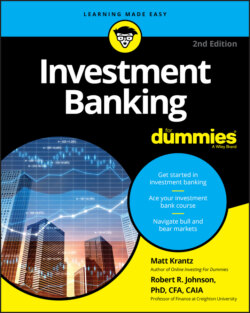Читать книгу Investment Banking For Dummies - Matthew Krantz - Страница 19
How investment banks get paid
ОглавлениеAs you can imagine, although investment banking plays an important role in funding economic progress, there’s also lots of money to be made. Investment bankers can’t afford those fancy suits if they’re not getting paid.
Investment bankers perform services for customers and collect money in a number of ways, include the following:
Commissions: Investment banks sometimes collect fees in exchange for conducting a financial transaction between a buyer and seller. One of the more common forms of commissions is often collected in the brokerage operations by some traditional banks and investment banks. For instance, Merrill Lynch, the brokerage and investment banking unit of Bank of America, charges commissions when purchasing stock for its customers. But that’s just a small example.
Underwriting fees: A lucrative area of investment banking generates fees for selling securities in the primary market (the collection of buyers’ and sellers’ interest in trading brand-new securities). When a company sells stock to the public for the first time, for instance, the investment banker who handles the deal, called the underwriter, collects a fee. (You can read more about companies selling stock to the public for the first time in IPOs in Chapter 3.)
Trading income: Investment banks usually handle other people’s money. But many investment banking operations also include a trading division. This unit attempts to take advantage of temporarily mispriced financial instruments. This high-risk proprietary trading is designed to generate profits for the firm.
Asset management fees: Some investment banks help their clients make decisions on how to invest their money. Investment banks generate asset management fees when they help clients decide which securities they should buy or sell.
Advisory fees: Companies often look to their investment banks for advice, especially in the cases of M&A deals. And in these cases, the investment bankers are brought in to provide in-depth, numerical analysis of a proposed deal. The companies pay substantial fees for this high-level assistance. (Read more about M&A deal making in Chapter 4.)
